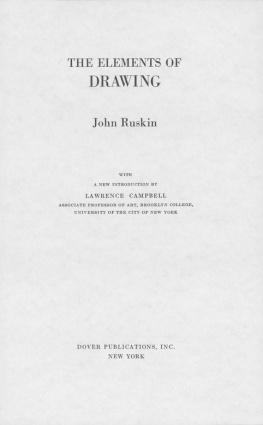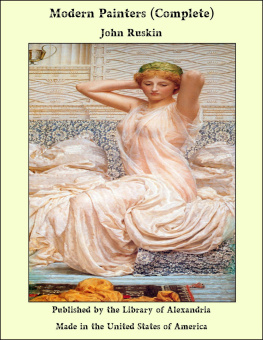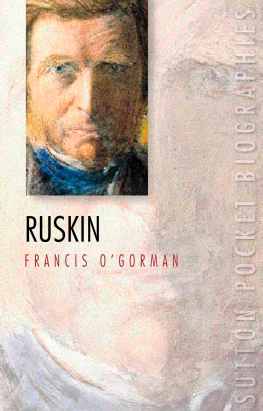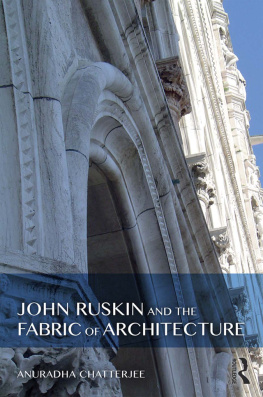John Ruskin - The Stones of Venice: The sea-stories
Here you can read online John Ruskin - The Stones of Venice: The sea-stories full text of the book (entire story) in english for free. Download pdf and epub, get meaning, cover and reviews about this ebook. publisher: John Wiley, genre: Science. Description of the work, (preface) as well as reviews are available. Best literature library LitArk.com created for fans of good reading and offers a wide selection of genres:
Romance novel
Science fiction
Adventure
Detective
Science
History
Home and family
Prose
Art
Politics
Computer
Non-fiction
Religion
Business
Children
Humor
Choose a favorite category and find really read worthwhile books. Enjoy immersion in the world of imagination, feel the emotions of the characters or learn something new for yourself, make an fascinating discovery.

- Book:The Stones of Venice: The sea-stories
- Author:
- Publisher:John Wiley
- Genre:
- Rating:5 / 5
- Favourites:Add to favourites
- Your mark:
- 100
- 1
- 2
- 3
- 4
- 5
The Stones of Venice: The sea-stories: summary, description and annotation
We offer to read an annotation, description, summary or preface (depends on what the author of the book "The Stones of Venice: The sea-stories" wrote himself). If you haven't found the necessary information about the book — write in the comments, we will try to find it.
The Stones of Venice: The sea-stories — read online for free the complete book (whole text) full work
Below is the text of the book, divided by pages. System saving the place of the last page read, allows you to conveniently read the book "The Stones of Venice: The sea-stories" online for free, without having to search again every time where you left off. Put a bookmark, and you can go to the page where you finished reading at any time.
Font size:
Interval:
Bookmark:
This is a digital copy of a book that was preserved for generations on library shelves before it was carefully scanned by Google as part of a project to make the world's books discoverable online. See the back of the book for detailed information.


ADVERTISEMENT.
It was originally intended that this Work should consist of two volumes only; the subject has extended to three. The second volume, however, will conclude the account of the ancient architecture of Venice. The third will embrace the Early, the Roman, and the Grotesque Renaissance; and an Index, which, as it gives, in alphabetical order, a brief account of all the buildings in Venice, or references to the places where they are mentioned in the text, will be found a convenient guide for the traveller. In order to make it mbre serviceable, I have introduced some notices of the pictures which I think most interesting in the various churches, and in the Scuola di San Rocco.
The third, and last, volume is already in the press.



THE
STONES OF VENICE.
FIRST, OR BYZANTINE, PERIOD.
CHAPTER L
THE TIIRONE.
i. In the olden days of travelling, now to return no more, in which distance could not be vanquished without toil, but in which that toil was rewarded, partly by the power of deliberate survey of the countries through which the journey lay, and partly by the happiness of the evening hours, when, from the top of the last hill he had surmounted, the traveller beheld the quiet village where he was to rest, scattered among the meadows beside its valley stream; or, from the long hoped for turn in the dusty perspective of the causeway, saw, for the first time, the towers of some famed city, faint in the rays of sunsethours of peaceful and thoughtful pleasure, for which the rush of the arrival in the railway station is perhaps not always, or to all men, an equivalent,in those days, I say, when there was something more to be anticipated and remembered in the first aspect of each successive halting-place, than anew arrangement of glass roofing and iron girder, there were few moments of which the recollection was more fondly che rished by the traveller than that which, as I endeavored to describe in the close of the last chapter, brought him within sight of Venice, as his gondola shot into the open lagoon from the canal of Mestre. Not but that the aspect of the city itself was generally the source of some slight disappointment, for, seen in this direction, its buildings are far less characteristic than those of the other great towns of Italy; but this inferiority was partly disguised by distance, and more than atoned for by the strange rising of its walls and towers out of the midst, as it seemed, of the deep sea, for it was impossible that the mind or the eye could at once comprehend the shallowness of the vast sheet of water which stretched away in leagues of rippling lustre to the north and south, or trace the narrow line of islets bounding it to the east. The salt breeze, the white moaning sea-birds, the masses of black weed separating and disappearing gradually, in knots of heaving shoal, under the advance of the steady tide, all proclaimed it to be indeed the ocean on whose bosom the great city rested so calmly; not such blue, sfot, lake-like ocean as bathes the Neapolitan promontories, or sleeps beneath the marble rocks of Genoa, but a sea with the bleak power of our own northern waves, yet subdued into a strange spacious rest, and changed from its angry pallor into a field of burnished gold, as the sun declined behind the belfry tower of the lonely island church, fitly named "St. George of the Seaweed." As the boat drew nearer to the city, the coast which the traveller had just left sank behind him into one long, low, sad-colored line, tufted irregularly with brushwood and willows: but, at what seemed its northern extremity, the hills of Arqua rose in a dark cluster of purple pyramids, balanced on the bright mirage of the lagoon; two or three smooth surges of inferior hill extended themselves about their roots, and beyond these, beginning with the craggy peaks above Vicenza, the chain of the Alps girded the whole horizon to the northa wall of jagged blue, here and there showing through its clefts a wilderness of misty precipices, fading far back into the recesses of Cadore, and itself rising and breaking away eastward, where the sun struck opposite upon its snow, into mighty fragments of peaked light, standing up behind the barred clouds of evening, one after another, countless, the crown of the Adrian Sea, until the eye turned back from pursuing them, to rest upon the nearer burning of the campaniles of Murano, and on the great city, where it magnified itself along the waves, as the quick silent pacing of the gondola drew nearer and nearer. And at last, when its walls were reached, and the outmost of its untrodden streets was entered, not through towered gate or guarded rampart, but as a deep inlet between two rocks of coral in the Indian sea; when first upon the traveller's sight opened the long ranges of columned palaces,each with its black boat moored at the portal,each with its image cast down, beneath its feet, upon that green pavement which every breeze broke into new fantasies of rich tessellation; when first, at the extremity of the bright vista, the shadowy Rialto threw its colossal curve slowly forth from behind the palace of the Camerlenghi; that strange curve, so delicate, so adamantine, strong as a mountain cavern, graceful as a bow just bent; when first, before its moonlike circumference was all risen, the gondolier's cry, " Ah! Stall,"* struck sharp upon the ear, and the prow turned aside under the mighty cornices that half met over the narrow canal, where the plash of the water followed close and loud, ringing along the marble by the boat's side; and when at last that boat darted forth upon the breadth of silver sea, across which the front of the Ducal palace, flushed with its sanguine veins, looks to the snowy dome of Our Lady of Salvation,f it was no marvel that the mind should be so deeply
* Appendix 1.: "The Gondolier's Cry."
f Appondix 2.: "Our Lady of Salvation."
entranced by the visionary charm of a scene so beautiful and so strange, as to forget the darker truths of its history and its being. Well might it seem that such a city had owed her existence rather to the rod of the enchanter, than the fear of the fugitive; that the waters which encircled her had been chosen for the mirror of her state, rather than the shelter of her nakedness; and that all which in nature was wild or merciless,Time and Decay, as well as the waves and tempests, had been won to adorn her instead of to destroy, and might still spare, for ages to come, that beauty which seemed to have fixed for its throne the sands of the hour-glass as well as of the sea.
H. And although the last few eventful years, fraught with change to the face of the whole earth, have been more fatal in their influence on Venice than the five hundred that preceded them; though the noble landscape of approach to her can now be seen no more, or seen only by a glance, as the engine slackens its rushing on the iron line; and though many of her palaces are for ever defaced, and many in desecrated ruins, there is still so much of magic in her aspect, that the hurried traveller, who must leave her before the wonder of that first aspect has been worn away, may still be led to forget the humility of her origin, and to shut his eyes to the depth of her desolation. They, at least, are little to be envied, in whose hearts the great charities of the imagination lie dead, and for whom the fancy has no power to repress the importunity of painful impressions, or to raise what is ignoble, and disguise what is discordant, in a scene so rich in its remembrances, so surpassing in its beauty. But for this work of the imagination there must be no permission during the task which is before us. The impotent feelings of romance, so singularly characteristic of this century, may indeed gild, but never save the remains of those mightier ages to which they are attached like climbing flowers; and they must be torn away from the magnificent fragments, if we would see them as they stood in their own strength. Those feelings, always as fruitless as they are fond, are in Venice not only incapable of protecting, but even of discerning, the objects to which they ought to have been attached. The Venice of modern fiction and drama is a thing of yesterday, a mere efflorescence of decay, a stage dream which the first ray of daylight must dissipate into dust. No prisoner, whose name is worth remembering, or whose sorrow deserved sympathy, ever crossed that "Bridge of Sighs," which is the centre of the Byronic ideal of Venice; no great merchant of Venice ever saw that Rialto under which the traveller now passes with breathless interest: the statue which Byron makes Faliero address as of one of his great ancestors was erected to a soldier of fortune a hundred and fifty years after Faliero's death; and the most conspicuous parts of the city have been so entirely altered in the course of the last three centuries, that if Henry Dandolo or Francis Foscari could be summoned from their tombs, and stood each on the deck of his galley at the entrance of the Grand Canal, that renowned entrance, the painter's favorite subject, the novelist's favorite scene, where the water first narrows by the Bteps of the Church of La Salute,the mighty Doges would not know in what spot of the world they stood, would literally not recognize one stone of the great city, for whose sake, and by whose ingratitude, their grey hairs had been brought down with bitterness to the grave. The remains of
Font size:
Interval:
Bookmark:
Similar books «The Stones of Venice: The sea-stories»
Look at similar books to The Stones of Venice: The sea-stories. We have selected literature similar in name and meaning in the hope of providing readers with more options to find new, interesting, not yet read works.
Discussion, reviews of the book The Stones of Venice: The sea-stories and just readers' own opinions. Leave your comments, write what you think about the work, its meaning or the main characters. Specify what exactly you liked and what you didn't like, and why you think so.












